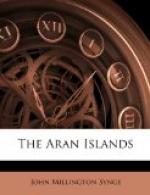He took me out to-day to show me the remains of some cloghauns, or beehive dwellings, that are left near the central ridge of the island. After I had looked at them we lay down in the corner of a little field, filled with the autumn sunshine and the odour of withering flowers, while he told me a long folk-tale which took more than an hour to narrate.
He is so blind that I can gaze at him without discourtesy, and after a while the expression of his face made me forget to listen, and I lay dreamily in the sunshine letting the antique formulas of the story blend with the suggestions from the prehistoric masonry I lay on. The glow of childish transport that came over him when he reached the nonsense ending—so common in these tales—recalled me to myself, and I listened attentively while he gabbled with delighted haste: ’They found the path and I found the puddle. They were drowned and I was found. If it’s all one to me tonight, it wasn’t all one to them the next night. Yet, if it wasn’t itself, not a thing did they lose but an old back tooth ’—or some such gibberish.
As I led him home through the paths he described to me—it is thus we get along—lifting him at times over the low walls he is too shaky to climb, he brought the conversation to the topic they are never weary of—my views on marriage.
He stopped as we reached the summit of the island, with the stretch of the Atlantic just visible behind him.
‘Whisper, noble person,’ he began, ’do you never be thinking on the young girls? The time I was a young man, the devil a one of them could I look on without wishing to marry her.’
‘Ah, Mourteen,’ I answered, ’it’s a great wonder you’d be asking me. What at all do you think of me yourself?’
’Bedad, noble person, I’m thinking it’s soon you’ll be getting married. Listen to what I’m telling you: a man who is not married is no better than an old jackass. He goes into his sister’s house, and into his brother’s house; he eats a bit in this place and a bit in another place, but he has no home for himself like an old jackass straying on the rocks.’
I have left Aran. The steamer had a more than usually heavy cargo, and it was after four o’clock when we sailed from Kilronan.
Again I saw the three low rocks sink down into the sea with a moment of inconceivable distress. It was a clear evening, and as we came out into the bay the sun stood like an aureole behind the cliffs of Inishmaan. A little later a brilliant glow came over the sky, throwing out the blue of the sea and of the hills of Connemara.
When it was quite dark, the cold became intense, and I wandered about the lonely vessel that seemed to be making her own way across the sea. I was the only passenger, and all the crew, except one boy who was steering, were huddled together in the warmth of the engine-room.
Three hours passed, and no one stirred. The slowness of the vessel and the lamentation of the cold sea about her sides became almost unendurable. Then the lights of Galway came in sight, and the crew appeared as we beat up slowly to the quay.




